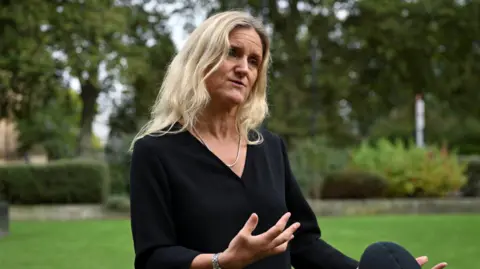Focus on families, says MP behind assisted dying bill
 Reuters
ReutersThe MP behind a move to legalise assisted dying has urged politicians to focus on the families affected by "harrowing deaths" of some terminally ill people when they decide whether to back it or not.
MPs will get their first chance to debate and vote on Kim Leadbeater's Terminally Ill Adults (End of Life) Bill in principle on Friday. Leadbeater said she expected the vote to be "very close".
Three former Tory prime ministers - Liz Truss, Boris Johnson and Theresa May - have now added their voices to ex-Labour PM Gordon Brown in opposition to the plans.
Six MPs have also put forward a so-called "wrecking amendment" aimed at preventing the Bill being debated, although it is unlikely to progress.
Anna Dixon, a Labour MP and co-signatory to the amendment, told BBC Radio 4's Today programme said: "We basically want time for more detailed scrutiny of this."
She added that there had been no public consultation or impact assessment yet.
Calling the amendment "disappointing" Leadbeater said: "The public clearly want this debate to take place and I think we've got a responsibility as parliamentarians to make sure that debate does take place."
"I think the vote will be very close," she added, because MPs were concerned "about the details" and passing her Bill at second reading would allow that further debate.
Responding to criticism her Bill would not have enough parliamentary scrutiny, she flagged that, if the proposed legislation is agreed in principle by MPs on Friday, there would still be "hours and hours and hours" of scrutiny over the next six months.
She also pointed to previous MP debates, such as the one in 2015, and Westminster committee reports and spoke about how society's attitudes towards dying have been changing over the last 10 years.
She added: "We're talking a lot about process... but what I'd actually really like to do in these last few days of debate and discussion is talk about the families, [of those] who are dying horrendous deaths.
"Dealing with people who are taking their own lives, dealing with people who have got no other alternative but to go to another country for an assisted death - if they can afford it."
The MP said palliative care specialists had told her they "cannot meet everyone's needs", which she said meant "you have people taking hours to die, days to die, traumatising loved ones".
The government is treating the Bill as a conscience issue, meaning MPs will have a free vote rather than being whipped to follow a party line, making the outcome of the vote difficult to predict.
Prime minister Sir Keir Starmer has previously supported assisted dying but has not said how he will vote on Friday.
He has asked his Cabinet not to campaign in the debate, but several ministers have spoken out, including the health secretary Wes Streeting, who is against it.
There have also been a series of high profile interventions, with three former Conservative prime ministers telling the Telegraph they oppose the plans, which would legalise assisted dying in England and Wales.
Liz Truss said "the judicial system should be protecting lives, not ending them" and "vulnerable people would be put under appalling pressure to end their lives early".
The BBC understands Baroness Theresa May and Boris Johnson are also against the proposed legislation, which would allow terminally ill adults expected to die within six months to seek help to end their own life.
Supporters of the bill argue it has strict safeguards to prevent coercion and would give people a choice over how they die to avoid unnecessary suffering.
The three former prime ministers are no longer MPs so will not get a vote this week. However, Baroness May is a member of the House of Lords so she would get an opportunity to vote on the bill if it is approved by MPs and progresses to the second chamber.
It comes after former Labour Prime Minister Gordon Brown also declared his opposition to the legislation last week, saying the death of his daughter convinced him of the "imperative of good end-of-life care".
Instead he called for a commission to look at how to improve palliative care.
End of life care was also raised at Prime Minister's Questions by Liberal Democrat leader Sir Ed Davey, who called on Sir Keir Starmer to protect funding for hospice services, raising the case of a constituent, Christine, whose father who lost out on palliative care due to funding cuts.
Davey said: "He died a few weeks later in excruciating pain - Christine said it was terrible to watch him suffer."
The PM responded that the government was putting in place a 10 year plan to fix the NHS, and pointed to the Terminally Ill (End of Life) Bill debate on Friday.
He said: "Whichever way that vote goes, we must invest properly in care across our health service... to make sure the NHS can give the care that everybody would expect across the spectrum, including end of life care."
